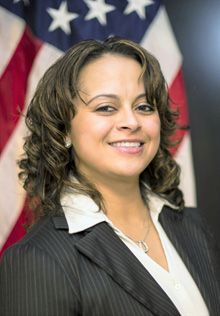Career Change: A governing voice for the voiceless
Find out how a veterinary career in the government may be just for you. (And you don't have to run for anything!)

Dr. Rachel CezarIs walking into the exam room seeming like the same old same old? That's what Rachel Cezar, DVM, was beginning to feel after two years of equine veterinary practice. Even with what might seem an exotic career in practice-a fellowship at the Hagyard McGee Medical Center in Lexington, Kentucky, and then an internship at Dubai Equine Hospital in Dubai, United Arab Emirates-Cezar was ready to move on to something different.
Luckily, she had some roots in government work. While she was attending veterinary school at Michigan State University, she was able to work part time for the Michigan Department of Agriculture as a veterinary student assistant.
The spark? “The state department of agriculture came to our school requesting students to come work for the department in the summer because they needed help due to a few disease outbreaks-bovine tuberculosis, West Nile virus and rabies,” says Cezar.
Flash forward
Cezar is a senior staff veterinary medical officer with the United States Department of Agriculture's Animal and Plant Health Inspection Services (APHIS) in Riverdale, Maryland. Specifically, until quite recently, she was the national horse protection coordinator.
“In this position I managed one of the most high-profile programs in APHIS that is responsible for enforcing the Horse Protection Act to eliminate soring-an abusive and inhumane training practice designed to make a horse perform an exaggerated unnatural gait,” says Cezar. “I supervised multiple full-time and intermittent veterinarians and animal care inspectors as well as oversaw third-party inspectors and worked with industry stakeholders and animal advocacy groups to diligently enforce the Horse Protection Act.”
She has now transitioned to a new position as director of animal imports, which involves overseeing a staff of veterinarians charged with managing and regulating importation of animals from other countries.
You too can be a government vet
Cezar says she is a big advocate for veterinarians getting involved in the federal government since there is a wide array of benefits. “When we graduate, we don't really think about how important the side benefits are-health insurance, life insurance, 401(k), legal aid, fitness gym discounts,” says Cezar. Other benefits as compared with traditional veterinary practice? Training opportunities, the chance to travel, vacation days, a 40-hour work week, all holidays off and NO being on-call.
And, really, Cezar doesn't miss traditional veterinary practice. “There is such a variety of issues I deal with, and I am not just helping one animal at a time. I am helping all animals worldwide,” she says.
Cezar's job is just one of a multitude in the government-marine mammal specialists, animal behaviorists, epidemiologists, public health advisors, foreign agricultural officers, port veterinarians, food safety inspectors, to name a few. “NASA even has veterinarians on staff,” she says.
Interested in making the switch? Cezar says she didn't need additional education or training before taking this job. “However my prior experience working in the government as a student helped me continue my career path in the government even with leaving it for a couple years.”
Also, as in all things involving a potential career switch up-network, network, network. “I had multiple fellow colleagues that I looked to for guidance toward this direction,” says Cezar. “Networking is key to getting to where you want to be.”
Why you can handle it
Cezar thinks the very nature of getting through veterinary school already makes veterinarians qualified for a career in government: You've been trained to work with any type of animal and can work in any environment. Face it, you learned under some challenging circumstances. “Because of the treacherous learning environment we endured-maybe I am just speaking for myself!-we are able to adapt very easily to the situation at hand,” says Cezar.
You can see current openings for veterinarians by searching usajobs.gov.
“Never think that you are not qualified to expand your career to other areas in veterinary medicine," says Cezar. "Look to others that are in the veterinary field you are interested in for guidance and direction on how to be the best candidate for the job. Don't be afraid to ask around-you never know what opportunity may come about.”